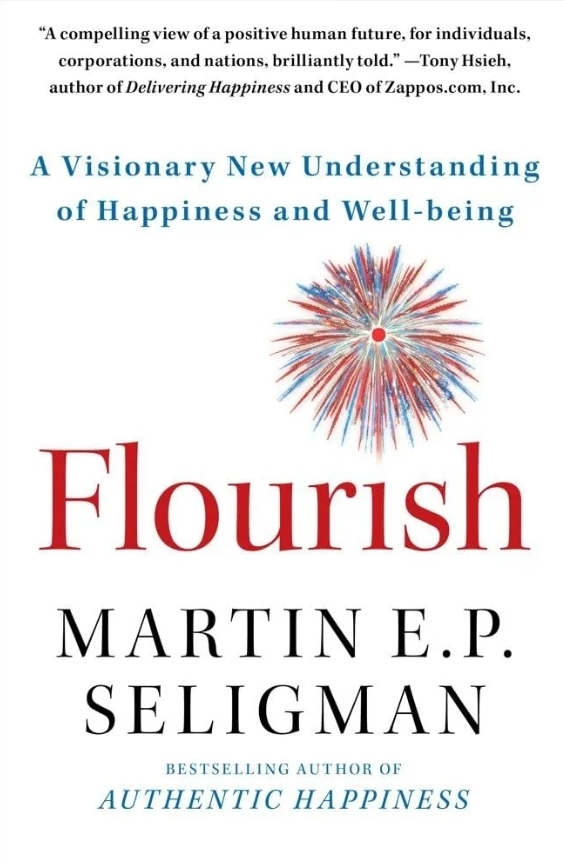Martin E. P. Seligman’s Flourish: A Visionary New Understanding of Happiness and Well-Being builds on his earlier work in Authentic Happiness to introduce a more comprehensive model of human flourishing. This book broadens the focus of positive psychology, emphasizing not just happiness but overall well-being, which encompasses multiple dimensions of human experience. Here is a detailed overview of its key concepts, framework, and applications:
Core Concept: The PERMA Model
Seligman introduces the PERMA model as a framework for understanding well-being. Each element is measurable and contributes to a flourishing life:
Positive Emotion (P)
- Experiencing joy, gratitude, hope, and contentment is essential for well-being.
- Positive emotions are important, but they are not the sole focus of flourishing.
Engagement (E)
- Deep involvement in activities (often referred to as “flow”) where one loses a sense of time and self-awareness.
- Engagement comes from using personal strengths to meet challenges.
Relationships (R)
- Strong, meaningful connections with others are critical for well-being.
- Positive relationships foster love, support, and shared joy, serving as a buffer against adversity.
Meaning (M)
- A sense of purpose derived from serving something greater than oneself, such as faith, community, or personal values.
- Meaning provides motivation and resilience in life.
Accomplishment (A)
- Pursuing and achieving goals, whether big or small, contributes to a sense of pride and capability.
- Accomplishments build confidence and reinforce resilience.
Why Well-Being Matters More Than Happiness
Seligman critiques the earlier focus on happiness as too narrow. Instead, he argues that a flourishing life is multifaceted and includes more than just feeling good.
- Beyond the Individual: Flourishing has implications for communities, schools, and institutions, emphasizing the societal benefits of promoting well-being.
- Sustainable Well-Being: The PERMA model encourages sustainable practices that contribute to long-term well-being rather than fleeting pleasures.
Applications of the PERMA Model
Education
- Seligman discusses integrating positive psychology into education to help children develop resilience, optimism, and character strengths.
- Programs like “Positive Education” focus on teaching emotional intelligence and growth mindsets alongside academics.
Workplace
- Applying the PERMA model in organizations can increase employee satisfaction, productivity, and creativity.
- Leaders can foster well-being by creating environments that promote engagement, collaboration, and meaningful work.
Therapy and Counseling
- Positive psychology tools can complement traditional therapy by helping clients focus on strengths and future goals, not just problems.
- Exercises like gratitude journaling, strength identification, and visualizing accomplishments are used to build well-being.
Community and Public Policy
- Well-being should be a goal of governments and communities, not just economic growth.
- Metrics for well-being (e.g., life satisfaction, relationships, and health) can guide policies and initiatives.
Key Strategies and Practices
Building Positive Emotion
- Gratitude practices: Writing thank-you letters, maintaining gratitude journals.
- Savoring moments: Actively appreciating and reflecting on positive experiences.
Enhancing Engagement
- Identifying strengths using tools like the VIA Character Strengths Survey.
- Aligning activities and work with personal passions and talents.
Fostering Relationships
- Strengthening bonds through active listening, empathy, and kindness.
- Prioritizing social connections and nurturing supportive communities.
Finding Meaning
- Connecting with values, spirituality, or causes greater than oneself.
- Volunteering, mentoring, or contributing to family and community.
Pursuing Accomplishments
- Setting SMART (Specific, Measurable, Achievable, Relevant, Time-bound) goals.
- Celebrating milestones and reflecting on achievements to build confidence.
Scientific Foundations
Seligman supports his ideas with robust research:
- Resilience and Optimism: Studies show that optimism can reduce stress and improve outcomes in health and relationships.
- The Role of Strengths: Using personal strengths increases engagement and fulfillment.
- Social Bonds and Longevity: Strong relationships correlate with better physical and mental health.
- The Importance of Goals: Achieving goals, no matter the size, contributes to self-efficacy and motivation.

Criticism and Refinements
- Overemphasis on Positivity: Some critics argue that positive psychology may minimize the importance of negative emotions and struggles.
- Applicability: Critics question whether PERMA can be universally applied across cultures and socioeconomic contexts.
- Revisions to the Model: Later works by Seligman acknowledge additional factors like physical health and environmental conditions.
Conclusion
Flourish redefines happiness as part of a broader vision of well-being. The PERMA model offers a practical, research-backed approach to thriving in all aspects of life—emotionally, socially, and professionally. Seligman’s work has inspired individuals, schools, and organizations to rethink success and prioritize sustainable practices for a more fulfilling life.







One Response
We need one person from Iron County to lead a small inquiry into the Nov 2024 General Election. Please reply to gold.ballots at protonmail.com